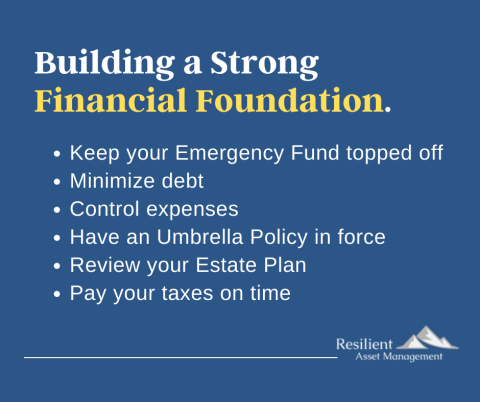
2022 Q3 Client Letter: Market Fluctuations, Interest Rates and Focusing on the Actionable
Greetings from World Headquarters in Memphis, TN. I hope all of you are doing well.
For us in the South, Fall is just about here after what has been a pretty sticky Summer...end of weather brief.
I am sending this letter out a bit early this quarter due to both some travel I will soon be doing and because of all the recent consternation in the capital markets. You should know we monitor the market activity every single day the market is open without fail...rain, shine, vacation, or whatever else, our finger is on the market's pulse.
Here are some thoughts for you to ponder...
The Stock and Bond Market
Anyone who follows financial markets knows 2022 has been a disaster where almost every asset class has been bamboozled. Historically, market corrections (meaning decreasing values) of 5% happen about every 7 months, 10% corrections happen on average about once every two years, and corrections of 20% or more happen about every 7 years. For completeness, past performance guarantees absolutely nothing about the future.
As I am typing this - on Friday, September 23, 2022 - the S&P 500 is down about 22.5% so far this year. Historically, there is nothing remarkable about the stock market being down this much...I realize that is little consolation right now. For as depressing as that number seems, I feel it ever more as I am the steward of much of your investable assets, and seeing markdowns of this magnitude hurts - it really hurts.
What has made this market correction particularly painful has been the marrying of losses in both the Stock AND Bond markets. This is indeed unusual and in fact only happens in about 10% of all calendar quarters dating back to 1926.
Stocks we expect to move around. Bonds, conversely, we look to for "ballast" in our portfolio. Not so in this market - and the culprit is something even Inspector Clouseau could surmise - interest rates. Let's unpack Interest Rates a bit....
Interest Rates
As any home buyer is aware, the interest rate of one's mortgage has a direct impact on affordability. For example, my 4.0% Mortgage, which I secured in January 2022 would have been a far different proposition at today's 6.65% going rate. More specifically, the Principal and Interest payment would be about 23% higher today than in January - some would call that meaningful.
While the math is somewhat inverted, rising interest rates have a similar impact on stocks. If one were to assume, as one should, that the value of any asset - be it a stock, rental house, or what have you - is the present value of future cash flows, then the current market value of ALL assets should fall as interest rates rise. Indeed in 2022, this has happened on a large scale....here is an example:
Let's say I agree to give you $1,000 per year every year for 10 years and interest rates are 2%. Using EXCEL, you can see the present value of that proposition is $8,982. Meaning, you could sell that future income stream for $8,982 and be financially equivalent.
Here comes the 2022-like part....let's say I change the interest rate in our example to today's 6.5%. Well, that same 10 years of $1,000 per year payments is now only worth $7,188, which is a reduction of about 20% in value.
This arithmetic example has played out in real time in 2022, both in the Bond and Stock Market.
Why This Happened
Trying to ascertain why something transpired in financial markets after the fact is dicey. As I have told you before, capital markets are complex adaptive systems with numerous independent and dependent variables. There are copious cause-and-effect dynamics constantly unfolding, so pinpointing anything with absolute accuracy is a fool's errand.
Did the numerous stimulus packages play a part? Probably. Did the dramatic reduction in interest rates in response to the pandemic contribute? Sure. What about the Russian invasion of the Ukraine? Pretty likely it had something to do with the morass.
Regardless of the why or how, we are where we are and we can't go back and sell everything at January's Peak. So what is one to do?
Where do We Go from Here
The above news is not all bad. For starters, if you are an accumulator/saver, then you should welcome lower prices...does anyone complain when their favorite items are on-sale at Costco? So for the savers amongst us, take at least some pleasure knowing how much more your dollars buy in the securities markets than 9 months ago.
For the retired folks who live off their assets, you should find sanctuary in the fact that for all of you, my Firm has placed multiple years worth of withdrawals in more stable commitments that will hopefully - nothing is guaranteed - build a bridge between now and happier market times.
To reiterate, nothing is guaranteed about future market performance. However, capitalism has a funny way of eventually finding a bottom and then blossoming to new heights...all that is required is patience and then riding the wave.
In the very simplest of terms, you get paid to wait in Capital Markets...typically, patience is eventually rewarded.
What Not to Do
When markets decline, one might be tempted to question the investment principles upon which one's investment portfolio was constructed. And more directly, one may be inclined to deviate from the historically prudent thing to do, which is simply to put your head down, grit your teeth, and grind through until the investment tides turn. To be sure, it is natural to question investment decisions when valuations are down.
Please keep in mind, market corrections were NEVER a question of "if", it was "when". The "when" is now and this won't be the last time markets recede. The key is not to lose faith in the capitalist spirit - believe me, capitalism finds a way. Don't try and overthink or overcontrol your investments...think Long-Term.
If you are curious what I'm doing, I'm grinding along just as I recommend you do. For all of us, we should control those things about which we have the most influence:
- Keep your Emergency Fund topped off;
- Minimize debt;
- Control expenses;
- Have an Umbrella Policy in-force;
- Review your Estate Plan; and
- Pay your taxes on-time.
Note: Controlling or even influencing the stock market is not on the list!
If you master the basics and leave your investments alone, sooner or later, market appreciation is likely to come your way.
In Closing
When the market realities set-in during the Lockdown in 2020, I held a series of open Zoom Calls to which any recipient of this email was invited. At the time, those seemed productive and those with questions or angst garnered some measure of relief from them, I think.
I am more than happy to conduct community Zoom calls if you all would like. If you are interested, please let me know - we can easily set these up.
If you would rather speak to me directly, no problem....that's why we are here. Simply respond to this note or call and we can arrange a meeting.
Thank you for your continued trust in Resilient Asset Management. We appreciate having each and everyone of you as a Client.
All the best,
Christopher Flis, CFP®
President
Resilient Asset Management




